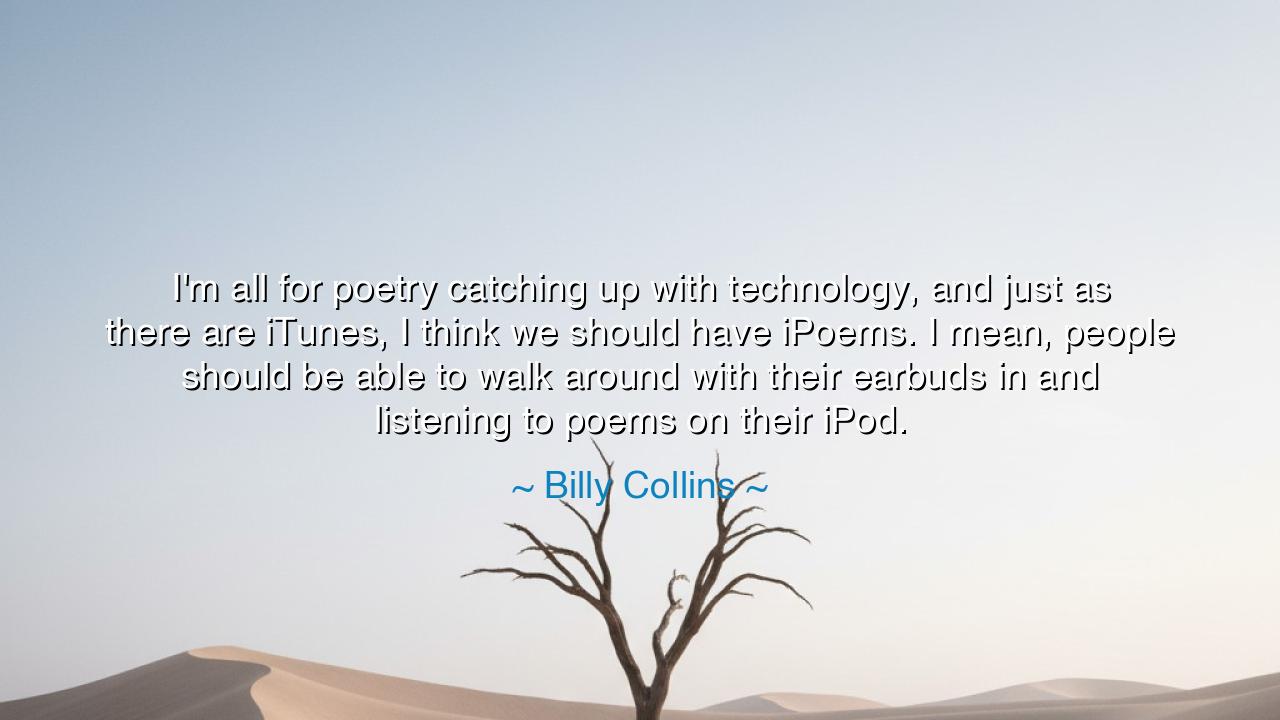
I'm all for poetry catching up with technology, and just as
I'm all for poetry catching up with technology, and just as there are iTunes, I think we should have iPoems. I mean, people should be able to walk around with their earbuds in and listening to poems on their iPod.






Hear the words of Billy Collins, poet of gentle irony and luminous vision, who declared: “I’m all for poetry catching up with technology, and just as there are iTunes, I think we should have iPoems. I mean, people should be able to walk around with their earbuds in and listening to poems on their iPod.” At first these words may seem light, even playful, but within them lies a call both profound and ancient: that the poetry of the human soul must not be abandoned in an age of machines, but must instead join hands with technology, so that it may endure, transform, and reach new ears.
The origin of this insight lies in the long struggle between tradition and innovation. Collins, who has long sought to bring poetry out of dusty classrooms and back into the daily lives of people, saw that technology—often accused of destroying attention and eroding depth—could also be the vessel by which poetry might live again. Just as the lyres of the ancients gave song to verse, just as the printing press gave permanence to Homer and Dante, so too might the iPod and digital streams carry the voices of poets into the rhythm of modern life. For in every age, the medium changes, but the need for the music of the soul remains.
The ancients themselves bore witness to this union of art and invention. When the rhapsodes of Greece recited Homer, they relied on memory and voice to keep the epics alive. But when writing arrived, some feared that the living presence of poetry would die. Instead, it flourished, carried across centuries in ink and parchment. So too in the Renaissance, when the printing press multiplied sonnets and plays, poetry left the court and entered the homes of common folk. Each leap in technology was a new birth for the art, not its death. Collins’ dream of “iPoems” is but the next turn of this eternal wheel.
Consider also the story of Bob Dylan, who fused poetry with the folk guitar and carried it across the airwaves to millions. Once, poetry was confined to books and journals; Dylan’s verse was sung, broadcast, amplified by microphones and radios. In this way, a new technology became the harp of the modern age. If a guitar and a record player could transform poetry into song for a generation, why should not earbuds and iPods deliver it to the hearts of listeners in ours? Collins’ jest contains a truth as old as civilization: poetry adapts, and in adapting, it survives.
The meaning of Collins’ words is not simply about format, but about accessibility. He longs for poetry to be part of the ordinary day, woven into commutes, workouts, and walks, as natural as music itself. For too long, poetry has been imprisoned in anthologies, regarded as difficult or distant. But with the aid of technology, it may again become what it was in the beginning: spoken, heard, shared in the air, alive in the ear. He imagines a world where men and women carry poems in their pockets as readily as songs, where verse whispers into their ears as they walk beneath the sky.
The lesson, O listener, is this: do not see technology as the enemy of the spirit. Instead, see it as a new vessel for ancient truths. Let poetry flow into new channels, that it may reach those who have forgotten its power. For the task of each generation is not to preserve art in its old form, but to carry its soul into new forms, lest it be lost. If the poet resists change, his words may fade; if he embraces it, his words may ride the current of time to shores unseen.
Therefore, let your actions be thus: embrace the tools of your age, but fill them with the treasures of your heart. Listen not only to music but to poems, to words that lift and heal. Support those who bring art into the digital world. And if you are a creator, do not despise the new platforms, but consecrate them with beauty. For as Collins dreamed of iPoems, so may you ensure that poetry—this most human of arts—marches with us into the future, alive, present, and forever entwined with the beating of the human soul.






AAdministratorAdministrator
Welcome, honored guests. Please leave a comment, we will respond soon